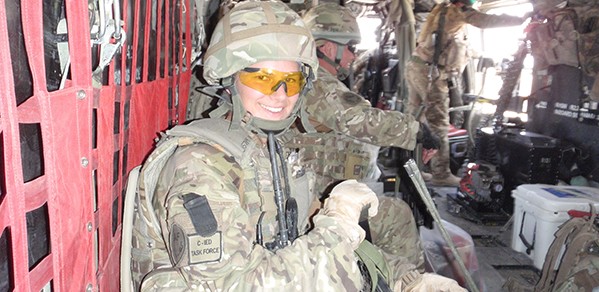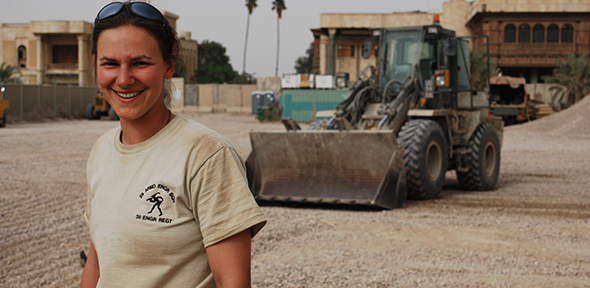
Major Angela Laycock (Emmanuel, 2001) has spent her career in The British Army working on tasks ranging from building infrastructure to searching for improvised explosive devices (IEDs).
I really enjoy engineering as it is all around us and it is the reason why things either stand up or fall down. Not many degrees and qualifications allow you to understand how things work and be part of a huge industry shaping our world. It is great to stand back at a finished project and say, “I helped build that”.
Major Angela Laycock
Now a professionally qualified engineer in the Royal Engineers, Angela currently works for 170 (Infrastructure Support) Engineer Group which consists of military engineers and reservists with specialisms in infrastructure.
We caught up with Angela to find out more.
Angela, how did you get into engineering?
I'd always liked maths and science at school, but I didn't know very much about engineering until I started to look at degree options at sixth form. Civil engineering appealed to me as it was maths and physics, but with a point: to design and build something at the end. During my A-Levels at Welbeck - The Defence Sixth Form College I was encouraged to apply for an Oxbridge place to study engineering. Having not even thought about going to university prior to Welbeck, I was lucky to be offered a place at Emmanuel College where I graduated with the MEng in Civil, Structural and Environmental Engineering.
What did you enjoy most about your Cambridge degree?
The breadth of the general engineering part of the degree has been useful throughout my career. Understanding electrical and mechanical engineering has certainly helped me to become a better civil engineer as I understand the broader parts of the project.
The ability to compete in high level sport whilst studying was also a great opportunity and I'd encourage others to do the same. At Cambridge, I rowed for my college, the University and also the Army. I’m now a cross country mountain biker and I ride for the Army and a civilian team at National Elite level. University is also a great way to build networks and relationships that you'll find yourself coming back to throughout your career, so get to know your fellow students and staff.

Angela managed the construction of a boat slipway at Basra Palace, Iraq.
How has your career progressed since graduating?
I'd always been keen to join the Royal Engineers as the job varied from building bridges to blowing things up. After Sandhurst, where I was awarded the Sword of Honour for being the top student, I went straight out to Germany where I was deployed to Iraq to command and manage construction projects in Basra.
When I returned from an operational tour in Afghanistan, I suffered problems with my digestive system which was thought to be Crohn’s disease and I thought I would be medically discharged from the Army. Luckily, I was able to use the time during my professional training to fully recover and rebuild my fitness.
I completed my professional engineer training in the Army during a two-year course where I studied for an MSc in Military Engineering and worked towards gaining chartered status. During the course, I went on a site placement to the Battersea Power Station Redevelopment Project to gain the experience required to sit the Chartered Professional Review with the Institution of Civil Engineers.
I'm now a Chartered Civil Engineer and I provide specialist engineering advice across the Ministry of Defence. I currently work for 170 (Infrastructure Support) Engineer Group where I look at overseas national infrastructure, how it is connected, and how best to prioritise repair and reconstruction following events such as hurricanes and earthquakes. Next year, I move on to Sub-Unit Command where I will manage either a Specialist Team Royal Engineer (STRE) who conducts operation design tasks or a squadron of combat engineers in a regular Royal Engineers Regiment.

While working on the Battersea Power Station Redevelopment Project Phase 1, Angela visited the Phase 2 enabling works.
What is your advice for women considering a career in engineering?
The construction site is still very male dominated, but just as there are now more women in the design office, there is no reason why more don’t work onsite. I found that the men I worked with on a construction site respected my qualifications and the knowledge that I brought. I was able to explain why it was important that things had to be built like they were designed, and I made sure they were working safely. I'd advise anyone to get to know the people you work with, especially the supervisors and project managers. Once they understand the value that you can add it doesn't matter what sex you are. In fact, being one of the only women makes it easier for people to remember you and find you too!
I really enjoy engineering as it is all around us and it is the reason why things either stand up or fall down. Not many degrees and qualifications allow you to understand how things work and be part of a huge industry shaping our world. It is great to stand back at a finished project and say, “I helped build that”.

